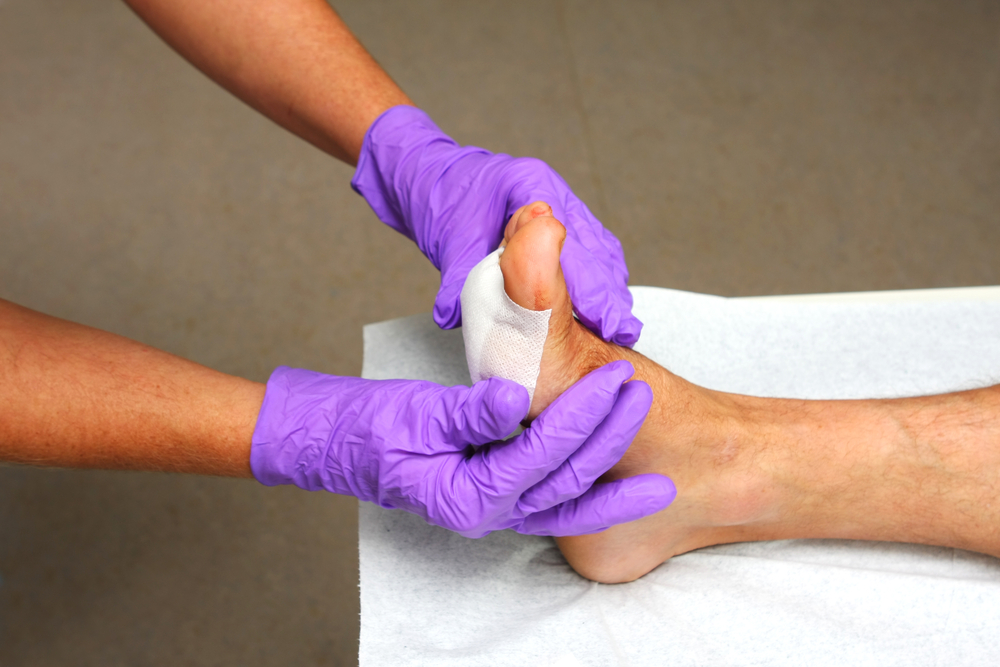March 2019
Reminder: When Was the Last Time...?
Symptoms of an Achilles Tendon Injury
 The Achilles tendon is considered to be the largest tendon in the body. Its function is to connect the heel to the calf muscles, and it is important for this tendon to maintain its flexibility and strength. It is typically put under pressure for the majority of the day as walking or running and jumping activities are completed. If an injury should occur to the Achilles tendon, it may become swollen and inflamed. This type of injury is known as tendonitis. A common symptom that can be associated with this condition may be pain in the heel and surrounding areas. If a rupture should occur, you may hear a popping sound emanating from the back of the heel. This is typically indicative of a serious injury, and medical attention should be sought as quickly as possible. If you have any pain in the back of the calf or in the heel, please consult with a podiatrist who can properly diagnose and treat an Achilles tendon injury.
The Achilles tendon is considered to be the largest tendon in the body. Its function is to connect the heel to the calf muscles, and it is important for this tendon to maintain its flexibility and strength. It is typically put under pressure for the majority of the day as walking or running and jumping activities are completed. If an injury should occur to the Achilles tendon, it may become swollen and inflamed. This type of injury is known as tendonitis. A common symptom that can be associated with this condition may be pain in the heel and surrounding areas. If a rupture should occur, you may hear a popping sound emanating from the back of the heel. This is typically indicative of a serious injury, and medical attention should be sought as quickly as possible. If you have any pain in the back of the calf or in the heel, please consult with a podiatrist who can properly diagnose and treat an Achilles tendon injury.
Achilles tendon injuries need immediate attention to avoid future complications. If you have any concerns, contact Joseph D. Ruffo, DPM, PC of New York. Our doctor can provide the care you need to keep you pain-free and on your feet.
What Is the Achilles Tendon?
The Achilles tendon is a tendon that connects the lower leg muscles and calf to the heel of the foot. It is the strongest tendon in the human body and is essential for making movement possible. Because this tendon is such an integral part of the body, any injuries to it can create immense difficulties and should immediately be presented to a doctor.
What Are the Symptoms of an Achilles Tendon Injury?
There are various types of injuries that can affect the Achilles tendon. The two most common injuries are Achilles tendinitis and ruptures of the tendon.
Achilles Tendinitis Symptoms
- Inflammation
- Dull to severe pain
- Increased blood flow to the tendon
- Thickening of the tendon
Rupture Symptoms
- Extreme pain and swelling in the foot
- Total immobility
Treatment and Prevention
Achilles tendon injuries are diagnosed by a thorough physical evaluation, which can include an MRI. Treatment involves rest, physical therapy, and in some cases, surgery. However, various preventative measures can be taken to avoid these injuries, such as:
- Thorough stretching of the tendon before and after exercise
- Strengthening exercises like calf raises, squats, leg curls, leg extensions, leg raises, lunges, and leg presses
If you have any questions please feel free to contact one of our offices located in Sea Cliff and Babylon, NY . We offer the newest diagnostic tools and technology to treat your foot and ankle needs.
Daily Foot Care Is Essential for Diabetic Patients
 Research has shown the importance of taking care of your feet, and this is especially true if you are a diabetic patient. Many diabetic people have neuropathy, and this may cause a lack of feeling in the feet. Small cuts or bruises may go unnoticed as a result of this condition and may take longer to heal. Foot ulcers may affect up to twenty-five percent of diabetic patients, and it is important to properly take care of your feet. This can be accomplished by checking the feet daily, which may help you to notice any blisters, ingrown toenails, cuts or swelling that may exist. Additionally, the feet should be washed in lukewarm water on a daily basis, gently dried, and followed by using a good moisturizer. This may help to keep the skin soft, which may prevent dry skin. Wearing shoes that fit properly will help the overall health of the feet and choosing seamless socks may aid in preventing cuts in the skin. If you have diabetes, it is strongly suggested that you should seek the counsel of a podiatrist who can properly guide you in learning how to take care of diabetic feet.
Research has shown the importance of taking care of your feet, and this is especially true if you are a diabetic patient. Many diabetic people have neuropathy, and this may cause a lack of feeling in the feet. Small cuts or bruises may go unnoticed as a result of this condition and may take longer to heal. Foot ulcers may affect up to twenty-five percent of diabetic patients, and it is important to properly take care of your feet. This can be accomplished by checking the feet daily, which may help you to notice any blisters, ingrown toenails, cuts or swelling that may exist. Additionally, the feet should be washed in lukewarm water on a daily basis, gently dried, and followed by using a good moisturizer. This may help to keep the skin soft, which may prevent dry skin. Wearing shoes that fit properly will help the overall health of the feet and choosing seamless socks may aid in preventing cuts in the skin. If you have diabetes, it is strongly suggested that you should seek the counsel of a podiatrist who can properly guide you in learning how to take care of diabetic feet.
Diabetic foot care is important in preventing foot ailments such as ulcers. If you are suffering from diabetes or have any other concerns about your feet, contact Joseph D. Ruffo, DPM, PC from New York. Our doctor can provide the care you need to keep you pain-free and on your feet.
Diabetic Foot Care
Diabetes affects millions of people every year. The condition can damage blood vessels in many parts of the body, especially the feet. Because of this, taking care of your feet is essential if you have diabetes, and having a podiatrist help monitor your foot health is highly recommended.
The Importance of Caring for Your Feet
- Routinely inspect your feet for bruises or sores.
- Wear socks that fit your feet comfortably.
- Wear comfortable shoes that provide adequate support.
Patients with diabetes should have their doctor monitor their blood levels, as blood sugar levels play such a huge role in diabetic care. Monitoring these levels on a regular basis is highly advised.
It is always best to inform your healthcare professional of any concerns you may have regarding your feet, especially for diabetic patients. Early treatment and routine foot examinations are keys to maintaining proper health, especially because severe complications can arise if proper treatment is not applied.
If you have any questions please feel free to contact one of our offices located in Sea Cliff and Babylon, NY . We offer the newest diagnostic and treatment technologies for all your foot and ankle needs.
Athletes Have Increased Risk of Stress Fractures
 Stress fractures occur when the foot experiences continual micro-trauma. This is common in athletes who push themselves in order to improve their performance. Stress fractures are caused by accumulative micro damage and can lead to small or large breaks. The body is capable of healing micro damage before it accumulates, but if the overuse is too intense, then the foot does not have time to heal itself. Factors that increase the risk of stress fractures are high running mileage, training errors, low bone density, inappropriate footwear, and high ridged arches. The pain associated with stress fractures is usually gradual, but can also begin with sudden pain. Localized bony pain and tenderness are the most common signs of stress reactions or fractures. It is important to lower the level of impact on your foot if you start to experience symptoms, so your body can heal itself. If you think you may have a stress fracture or are showing early signs of one, then it is suggested you consult with a podiatrist to learn about treatment options.
Stress fractures occur when the foot experiences continual micro-trauma. This is common in athletes who push themselves in order to improve their performance. Stress fractures are caused by accumulative micro damage and can lead to small or large breaks. The body is capable of healing micro damage before it accumulates, but if the overuse is too intense, then the foot does not have time to heal itself. Factors that increase the risk of stress fractures are high running mileage, training errors, low bone density, inappropriate footwear, and high ridged arches. The pain associated with stress fractures is usually gradual, but can also begin with sudden pain. Localized bony pain and tenderness are the most common signs of stress reactions or fractures. It is important to lower the level of impact on your foot if you start to experience symptoms, so your body can heal itself. If you think you may have a stress fracture or are showing early signs of one, then it is suggested you consult with a podiatrist to learn about treatment options.
Activities where too much pressure is put on the feet can cause stress fractures. To learn more, contact Joseph D. Ruffo, DPM, PC from New York. Our doctor can provide the care you need to keep your pain free and on your feet.
Dealing with Stress Fractures of the Foot and Ankle
Stress fractures occur in the foot and ankle when muscles in these areas weaken from too much or too little use. The feet and ankles then lose support when walking or running from the impact of the ground. Since there is no protection, the bones receive the full impact of each step. Stress on the feet can cause cracks to form in the bones, thus creating stress fractures.
What Are Stress Fractures?
Stress fractures occur frequently in individuals whose daily activities cause great impact on the feet and ankles. Stress factors are most common among:
- Runners
- People affected with Osteoporosis
- Tennis or basketball players
- Gymnasts
- High impact workouts
Symptoms
Pain from the fractures occur in the area of the fractures and can be constant or intermittent. It will often cause sharp or dull pain with swelling and tenderness. Engaging in any kind of activity which involves high impact will aggravate pain.
If you have any questions please feel free to contact one of our offices located in Sea Cliff and Babylon, NY . We offer the newest diagnostic and treatment technologies for all your foot and ankle needs.





